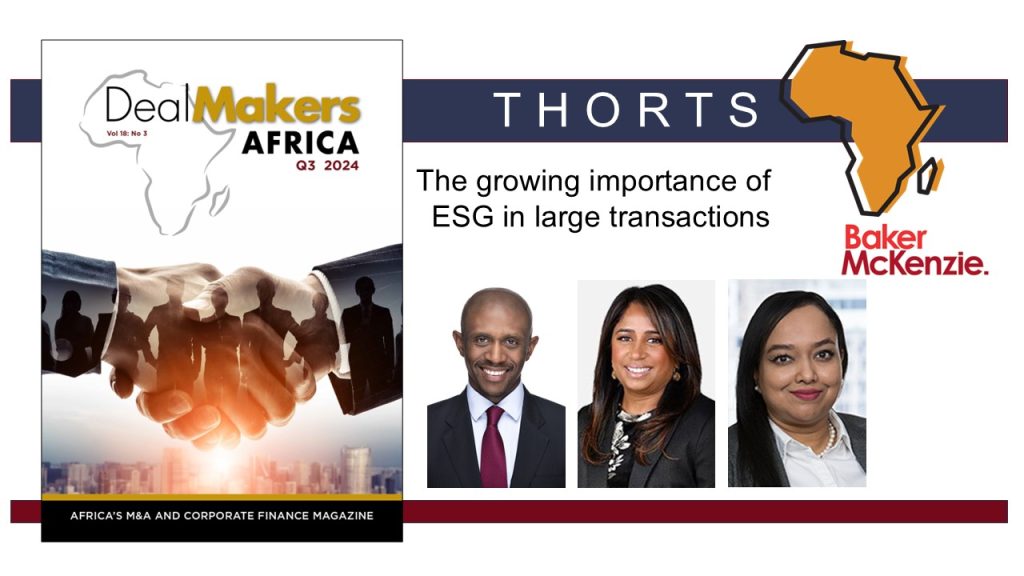Global institutional capital is increasingly focused on sustainability, both as an investment opportunity and as part of investment criteria. This is driven by the forecasted (positive and negative) economic impact of the climate change mega-trend, regulation such as the EU’s Carbon Border Adjustment Mechanism, and societal pressure to address unsustainable corporate practices.
Africa presents fertile ground for scalable, high impact Environmental, Social and Governance (ESG) projects and programmes. The continent boasts some of the world’s richest renewable energy generation potential, and many of the resources needed to build green technologies. African countries’ unique developmental journeys also present a wide range of opportunities for corporate supported social interventions to have a real impact.
Sub-Saharan Africa has great potential for investments with material sustainability outcomes, and this is already being realised through higher transaction volumes and values in industries that are enablers of sustainability initiatives, such as renewable energy, copper, and other green tech minerals.
Sustainable, alternative investments are another key opportunity, with major African bourses listing green and sustainability linked bonds for several years, and the Johannesburg Stock Exchange’s (JSE) Socially Responsible Investment (SRI) index’s continuous innovation. Social impact investments by corporates are also on the rise, with the recognition that when properly designed and implemented, these projects and programs can have an exponential impact on an organisation’s sustainability credentials and, most importantly, the lived reality of the participants.
The sub-Saharan Africa region is witnessing a surge in ESG-focused investments, catalysed by an increasing awareness of, and appetite to pursue, the opportunities presented by sustainable investment in Africa. The importance of leveraging ESG for economic development has been recognised, not only in market led initiatives such as green finance and sustainable investment strategies, but also in state-led, multilateral initiatives like the African Union’s Agenda 2063. The market is seeing an increasing trend towards factors within the sustainability / ESG stable becoming central in large transactions. Capital is being directed towards value chains set to benefit from sustainability driven changes, like the electric vehicle value chain. Companies are driven to integrate ESG practices, not only to ensure continued social and regulatory license to trade, but as a strategic imperative to attract investment. Africa is well-positioned to attract large investments into its strategic sectors, and presents an opportunity for multinationals and other corporates to make investments that will have an exponential impact on their sustainability scorecard.
Climate change and increased scrutiny of corporates’ sustainability practices by the public and regulators has driven ESG high up the agenda of many institutional investors and major corporates, leading to an increase in sustainability-focused investments – either purely for the green credentials, or for the potential for returns from a value chain that will benefit from increased take-up of sustainability actions. The deployment of capex and opex budgets by corporates is also increasingly being influenced by factors such as the social and environmental impact of the spend. ESG factors are thus becoming important considerations in transactions, especially in sectors which are set to grow due to sustainability initiatives, or those that are either socially or environmentally sensitive.
ESG’s role as a major market force is undoubtable, with ESG-focused investments having surged and assets held surpassing US$30 trillion in 2022. The importance of ESG is emphasised by the significant rise in green and sustainability-linked financial service offerings, and ESG-focused spending by Corporates.
ESG’S MOMENTUM IN AFRICA
While sustainable investment is a global trend, Africa is seeing the manifestation of this shift through targeted initiatives and strategic investments that address both regional development and global sustainability goals. Indications of momentum include:
Strategic development initiatives: The African Union’s Agenda 2063 integrates ESG as a key factor for continental development, prompting initiatives such as Gabon’s “Green Gabon” for renewable resource regulation, Benin’s launch of green bonds, and Côte d’Ivoire’s mandatory CSR reporting since 2014.
Corporate strategy: a 2023 Oxford Business Group study revealed that 19.7% of African CEOs pursued ESG standards to enhance their reputation, alongside motivations like regulatory compliance and stakeholder demands. Companies adopt ESG principles to ensure their license to trade and attract capital, which is increasingly targeted at sustainable investments.
South African initiatives: South Africa is a leading African jurisdiction for sustainable investments with national measures. The Johannesburg Stock Exchange (JSE) was the first global stock exchange to introduce a SRI index and it has listed over 70 sustainability-linked bonds, raising approximately R11 billion in 2023. A 2024 review showed significant ESG adoption among JSE-listed companies, highlighting South Africa’s proactive role in promoting sustainable finance and ESG integration across the region. ESG has also been a priority from a regulatory perspective, with the introduction of amendments to the Pensions Fund Act and Public Investment Corporation Act regulations to drive sustainability requirements.
ESG AND SUSTAINABILITY ARE KEY THEMES IN RECENT LARGE AFRICAN TRANSACTIONS
ESG has been a key consideration in recent major transactions in Africa, including:
- Proparco Group’s September 2024 investment of $15 million into Pembani Remgro Infrastructure Fund II (PRIF II), a leader in infrastructure investments in Africa with strong ESG credentials;
- Vitol Africa’s recent acquisition of Engen for R37 billion, a significant investment into South Africa, with strong ESG underpinnings due to its impact on disadvantaged communities; and
- a R9,3 billion loan provided by several lenders, including the Development Bank of Southern Africa Limited; Old Mutual Alternative Investments; Sanlam; and Stanlib Alternative Investments to fund Oya Energy, a hybrid energy project combining solar, wind, and lithium-ion batteries, expected to be the largest initiative of its kind in Africa.
Major corporate and investment banks with strong ESG focuses have also made a significant impact in the region. One South African bank has issued approximately R45 billion in sustainable financing and mobilised approximately R15,5 billion in green project finance and an additional R1,2 billion in social project finance to fund renewable energy, carbon projects, and basic infrastructure in Africa; and another has embraced numerous climate-related initiatives, such as their Green Private Power Tier 2 Bond, launched in 2023 with a notional value of R2,1 billion.
In addition, there are major renewable energy infrastructure projects being financed and coming online in Africa. For example, the Hive Hydrogen Project in Gqeberha – a $4,6 billion project that involves the construction of a green ammonia plant in the Coega Special Economic Zone – which aims to produce 780,000 tons of green ammonia annually, powered by renewable energy sources.
OVERCOMING THE CHALLENGES OF SUSTAINABLE INVESTING IN AFRICA
To successfully tap into the sustainable investment opportunities presented by sub-Saharan Africa, global corporates and capital must overcome the unique challenges of deploying capital and operating in the various jurisdictions on the continent, which requires an intimate and practical knowledge of the diverse regulatory frameworks in operation. In cases such as this, companies looking to invest will be best served by an adviser that understands their needs and priorities, as well as the intricacies of the African investment landscape.
Pitso Kortjaas, Lydia Shadrach-Razzino and Virusha Subban are Partners in Banking & Finance, M&A and Tax | Baker McKenzie (Johannesburg)

This article first appeared in DealMakers AFRICA, the continent’s quarterly M&A publication.
DealMakers AFRICA is a quarterly M&A publication
www.dealmakersafrica.com



